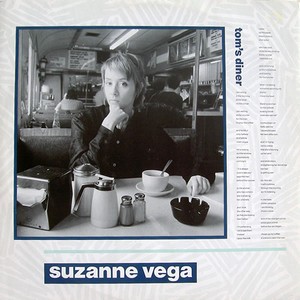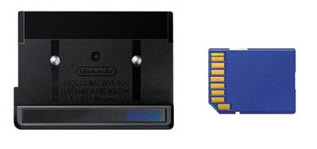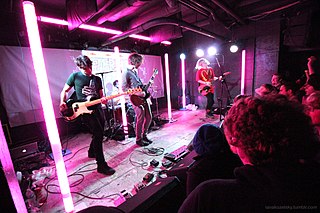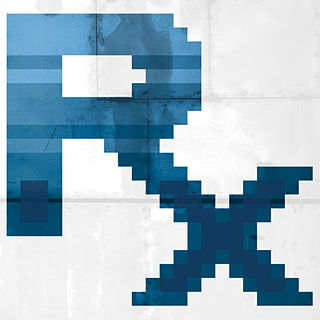
Chiptune is a style of synthesized electronic music made using the programmable sound generator (PSG) sound chips or synthesizers in vintage arcade machines, computers and video game consoles. The term is commonly used to refer to tracker format music using extremely basic and small samples that an old computer or console could produce, as well as music that combines PSG sounds with modern musical styles. It has been described as "an interpretation of many genres" since any existing song can be arranged in a chiptune style defined more by choice of instrument and timbre than specific style elements.
Video game music (VGM) is the soundtrack that accompanies video games. Early video game music was once limited to sounds of early sound chips, such as programmable sound generators (PSG) or FM synthesis chips. These limitations have led to the style of music known as chiptune, which became the sound of the first video games.

The Game Boy Camera, released as Pocket Camera in Japan, is a Nintendo accessory for the handheld Game Boy game console. It was released on February 21, 1998, in Japan, and manufacturing ceased in late 2002. As a toy for user-generated content, it can be used to shoot grayscale photographs, edit them or create original drawings, and transfer images between GBC units or to the 64DD art game suite Mario Artist. The accessory featured a 180°-swivel front-facing camera that allowed users to capture selfies. Its images can be printed to thermal paper with the Game Boy Printer. The GBC's cartridge contains minigames based on Nintendo's early games such as the arcade video game Space Fever and the Game & Watch handheld game Ball, and a chiptune music sequencer; photographers have embraced its technological limitations as artistic challenges.

"Tom's Diner" is a song by American singer and songwriter Suzanne Vega. Written on November 18, 1981, it was first released as a track on the January 1984 issue of Fast Folk Musical Magazine. Originally featured on her second studio album, Solitude Standing (1987), it was released as a single in Europe only in 1987 following the success of her single "Luka". It was later used as the basis for a remix by the British group DNA in 1990, which reached No. 1 in Austria, Germany, Greece and Switzerland.

The Play-Yan is a media player designed for the Game Boy Advance SP and also compatible with the Game Boy Micro and Nintendo DS. It uses SD flash memory to play MP3 audio files and H.264/MPEG-4 AVC video files. It can also play 13 bonus mini-games, all of which are available freely on the Nintendo website in Japan. Sales of the Play-Yan were discontinued on September 11, 2005.

8 Bit Weapon is an American chiptune music band formed in Ventura County, California, by Seth and Michelle Sternberger. It was originally created by Seth Sternberger around 1998. Its instruments consists primarily of old 8-bit and 16-bit computers such as the VIC-20, Commodore 64, Commodore 128, Amiga 500, and the Apple II, as well as game consoles such as the Nintendo Entertainment System, Game Boy, Atari 2600, and an Intellivision synthesizer.

Trash80 is a micromusic/bitpop project from Timothy Lamb, a pioneer of independent Game Boy music. He has published several songs online under a Creative Commons license (BY-NC-ND) under the Trash80 and Tresk banners. Whereas many Trash80 songs are ambient soundscapes featuring the use of Game Boy sounds, Tresk songs feature simple piano lines. Most prominently, Lamb's music has been featured on the soundtrack of the real-time strategy game Darwinia.

Pixelh8 is the stage name for Matthew Applegate, a British chiptune composer, educator and screen actor.

8-Bit Operators: The Music of Kraftwerk was released in 2007 by the group 8-Bit Operators on Kraftwerk's US label Astralwerks and EMI Records worldwide. It features cover versions of Kraftwerk songs by several prominent chiptune artists.

8bitpeoples is an artist collective and netlabel centered in New York City that focuses on chiptune aesthetics, which is heavily influenced by vintage videogames. 8bitpeoples was founded in 1999 by Jeremiah "Nullsleep" Johnson and Mike "Tangible" Hanlon. It is run by Johnson and Joshua "Bit Shifter" Davis.

The Blip Festival was a festival that celebrated chiptune music with musical performances, workshops, and screenings of movies. It was held annually starting in 2006 in New York City. In recent years, there have been international versions of Blip Festival held in Europe, Asia, and Australia. The festival is curated and organized by 8bitpeoples, one of the foremost labels in the chiptune scene, as well as local arts organization The Tank. The New York festival has switched venues several times, beginning in 2006 at 15 Nassau Street in Manhattan, then moving to Eyebeam Art and Technology Center in 2007, and then being held in Brooklyn at The Bell House in 2008 and 2009. It went back to Eyebeam in 2011 and then the Gramercy Theatre in 2012.

Anamanaguchi is an American chiptune-based pop and rock band from New York City. The band has four members: lead songwriters and guitarists Peter Berkman and Ary Warnaar, bassist James DeVito, and drummer Luke Silas.

she is a musical project formed in 2003 by the Polish artist, producer and musician Lain Volta Trzaska, and is sometimes credited as shemusic, Lain Volta. As its main producer, songwriter, and instrumentalist, Lain is the only official member, but he brings in vocalists to perform.

The Depreciation Guild was an American dream pop and shoegaze band from Brooklyn, New York, formed in 2005 by lead vocalist and songwriter Kurt Feldman and guitarist Adrian Hashizume. Before disbanding, their lineup included Feldman, Christoph Hochheim, and Anton Hochheim. They were joined for live performances by Raphael Radna on bass guitar.
Ten Thousand Free Men & Their Families is a musical project of Sydney based Game Boy music composer and performer Thomas Gilmore, who began writing music with the Nintendo Game Boy in 2007. Shortly after in 2008, Gilmore and Dot.AY from Brisbane started a blog documenting and promoting Australian chipmusic called GameBoyAustralia. In early 2011, Gilmore and Eugene Davoren-Britton launched a vinyl-only chipmusic label called Sounds Legit. The name for Gilmore's project was inspired by the A Lesson Is Learned But The Damage Is Irreversible webcomic of a similar title. Gilmore currently performs live vocals in a hardcore punk style that transcends the regular boundaries of chipmusic, to form a style of music that Gilmore calls "chipunk". In March 2016, after a period of silence from the act, a live band manifestation of Ten Thousand Free Men & Their Families played at Square Sounds Festival Melbourne.

Levi "Doctor Octoroc" Buffum is an American chiptune musician and pixel artist based in Philadelphia.

Goto80 is a Swedish music artist and researcher. He has been described as one of the key players between glitch and chipmusic, as well as an active demoscener. At the turn of the millennium he was one of the first to bring chipmusic to a wider audience, and was also an early adopter of live Game Boy music. He has an extensive back catalogue of free music – often open source – with a wide span of musical influences. He currently focuses on research and art, and maintains a number of blogs and labels such as Chipflip and the text-mode tumblr.

Brendan Becker, known by his stage name Inverse Phase, is an American video game composer and chiptune musician, using Atari, Commodore, and Nintendo hardware. He also speaks and hosts workshops on video game music, chiptunes, and composing.

Psilodump is a Swedish musician, DJ, and producer based in Stockholm. He has also released work under his real name and as Psilodumputer, Pushiro, and J.Panic.
The Ming Mecca is a pixel art-oriented modular sound and interactive video synthesizer designed by Jordan Bartee, manufactured by Special Stage Systems, and released in 2014. It was followed by the Ming Micro in 2016.















